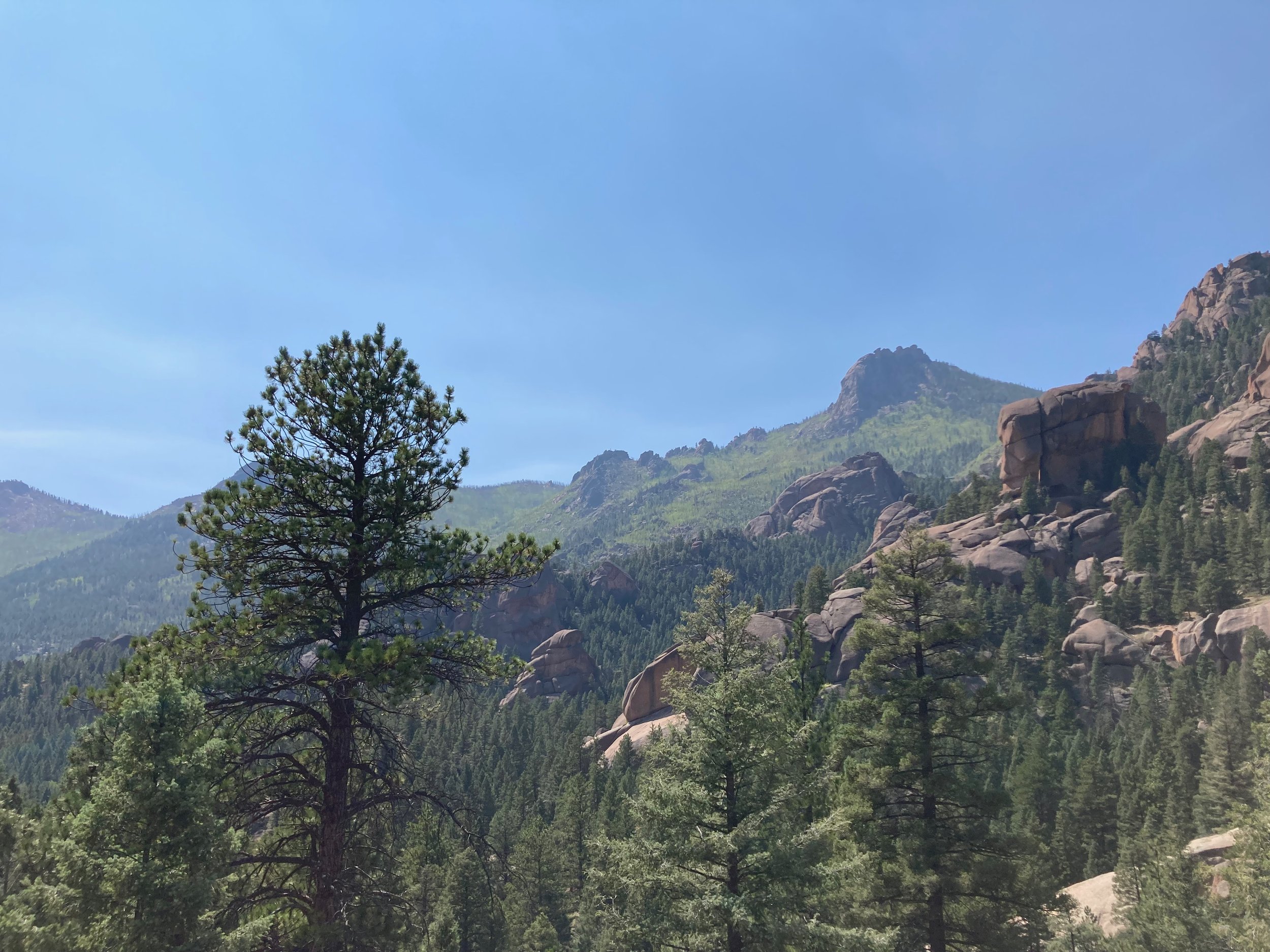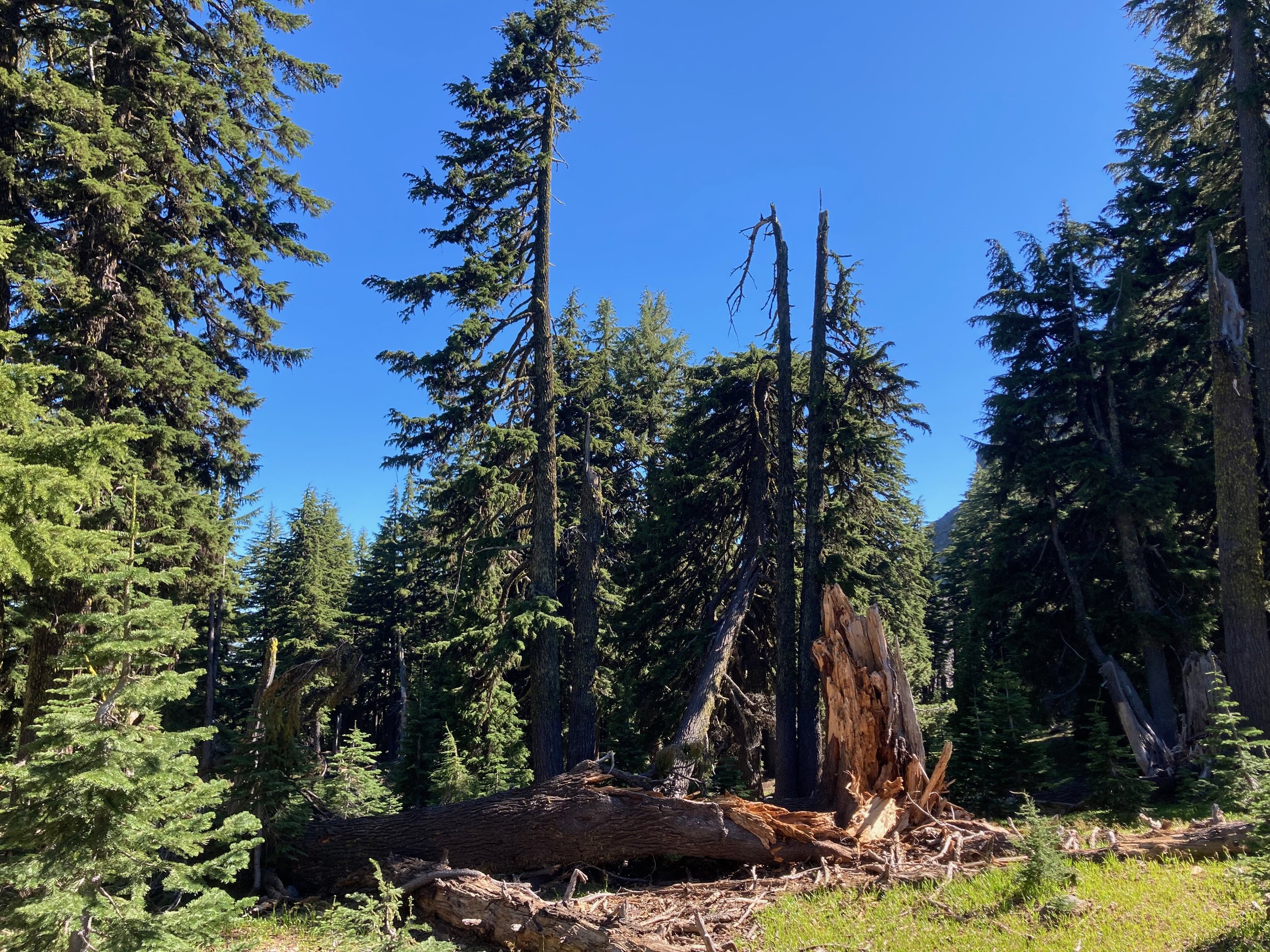Ecotherapy & Wilderness Therapy in Colorado
HeAling in & through Relationship to Nature
Traditional talk therapy doesn’t work for everyone
You’ve been searching for therapy and support that will work for you, but noticing all the available options seem like they’re made for someone else.
Maybe you can’t imagine finding healing while confined in a sanitized office space. It feels isolated and restrictive; it’s cold and removed. You need to heal in connection with the world, not apart from it.
Maybe you can’t find the words for your experience yet, or you don’t even want to. Traditional therapy often compels us to tell every detail of what happened to us, which can be impossible for some and re-traumatizing for others.
Not finding options that feel like a fit for you can leave you feeling even more stuck.

Ecotherapy & Wilderness therapy provide new opportunities for your healing and growth
Let’s leave the office behind…
Nature is expansive, creating space for you and your healing process to be expansive too. Nature is full of life and connection, nearly the opposite of a traditional office, no matter how cozy the couch is.
We’ll partner with the natural world…
Nature provides a container that allows for the use of metaphor and experiential interventions that can generate healing without requiring us to share triggering details of our stories, certainly not before we’re ready.
We can reconnect to your innate wildness…
We aren’t actually separate from nature and “the wild.” Part of healing in connection with the world is recognizing the ways society contributes to our disconnection from the world around us, the land we are on, and our more-than-human kin. As that disconnection has grown, so has our disconnection from ourselves. Reconnecting with the more-than-human world can support us in reconnecting with ourselves and our own innate wildness.
You don’t have to seek healing and growth in that stuffy and cold office.
And you don’t have to feel so removed from the world around you.
Ecotherapy can help you:
Find healing through an “out-of-the-box” approach
Re-develop relationship to nature
Process climate anxiety & grief to support individual movement toward global change
Explore & process trauma through nature-relationship, nature-metaphor, & experiential learning
Improve communication & trust within your group or family
Mark & honor transitions in your life through ceremony, ritual, & rites of passage
Frequently Asked Questions about Wilderness & Ecotherapy
-
A: Being outside in nature in and of itself is healing. Time in nature supports nervous system regulation, reduction in stress and anxiety, improvement in sleep patterns, reduction in inflammation, improved concentration, and so much more!
Additionally, nature is non-judgmental. So many of us have had experiences of being told we are too much or not enough of one thing or another. And we often find ways to direct those messages toward ourselves after a certain point of hearing them so loudly elsewhere. Nature doesn’t thrust those judgments on us, instead we are invited just as we are into her spaciousness.
-
A: Wilderness Therapy is a broad term that typically includes Ecotherapy, Ecopsychology, Adventure Therapy, Outdoor Education, Animal-Assisted Therapies, Horticulture Therapy and Nature Quests, The primary theme in all of these approaches is that nature and relationship with nature are an intentional part of the therapeutic or educational process and learning.
Approaches can incorporate simple mindfulness in or with nature; adventure and experiential practices in which present-moment experience is brought to conscious awareness, allowing for deeper learning and healing; nature-metaphor to find understanding and mirror in nature; as well as backcountry intensives over larger periods of time.
-
A: Not quite. Although that is an option, to get the full benefit of this approach we completely change what we do and how we do it. Remember, this work necessitates that nature and relationship to nature be an intentional part of the therapeutic or educational process.
I view nature as my co-therapist in this work, a wise elder and friend who has so much to teach me. And some of that teaching allows me to better support you in your work. And we all have so much to learn from nature, especially about ourselves. Further, nature offers opportunities to (and sometimes requires that we) learn about adapting to change, building resilience, incorporating awareness of context in how we move through the world, slowing down, and being present.
This work isn’t just about being in nature because it improves our health (although that is true!), it is about being in relationship with nature in a way that doesn’t “other” or objectify.
-
A: Absolutely not! We can bring nature-based therapy into virtual/telehealth work as well as future in-office work. Additionally, this approach can be used in the time of a typical session (50-minutes) or we can plan for extended sessions without being required to extend to half-day, whole-day or multi-day.
-
A: Yes! Typically, these offerings are custom made for those seeking this type of work. Structure and planning is developed based on your general goals or intentions, in addition to needs identified in planning. Further, they are offered to individuals, groups, or families.
Locations vary, ranging from backcountry camping to stays at remote retreat centers or cabins within Colorado. Additionally, they can incorporate backpacking, canoeing, expressive arts, hiking, journaling, solos, ceremony, ropes courses, movement-based therapeutic interventions and more.
Type and number of staff present (i.e. wilderness guides and additional therapists) is dependent on the request, identified participant needs, types of activities or experiences, and the assessed risks to be mitigated in planning.
-
A: Not at all. Intensives can definitely be supportive of ongoing therapeutic work and are sometimes encouraged when clinically indicated. However, an ongoing therapeutic relationship with me is not required to be eligible for or benefit from intensives or retreats.
I most often offer intensives to groups or families who do not have or intend to have an ongoing therapeutic relationship with me. For example, some families want support in integration and reunification when a child is completing and discharging from a longer-term wilderness-based residential program. Additionally, I may offer a group intensive (for participants that do not already have established relationships) for a shared identity/experience like LGBTQIA+ survivors of sexual violence. Further, a group or organization may reach out to me for an intensive or retreat for their already established group.
Finally, I offer individual intensives, quests, or retreats for those looking to spend a contained amount of time committed to personal work, even when ongoing therapeutic work with me is not desired or sustainable.
-
A: I sure do! In addition to 15+ years in outdoor education and nature-survival skills, my graduate training is in Clinical Mental Health Counseling with an emphasis in Transpersonal Wilderness Therapy. Further, I have a certification as a Wilderness First Responder, which I initially obtained in 2013 and continue to take the appropriate coursework and testing to recertify every 2-3 years.
-
A: It most definitely is.
I use the term “Wilderness Therapy” here because it is the most recognized term to incorporate all these fields and allow people who are searching for this type of work to find this information. However, I typically use the word “Ecotherapy” in referring to this work and generally offer compassionate education around the harmful history of the field of “wilderness therapy,” especially in relation to oppression, in addition to issues with the concept of “wilderness” to support movement away from this ideology.
The concept of “wilderness” is problematic in many ways, and also further highlights the need for mental health supports which incorporate relationship to nature and understanding of the ecology of human and more than human world.
As human beings and part of nature, our separation from the land we are located on and the earth we inhabit contributes to individual, societal, and collective disease. It perpetuates the concept of land and the earth as an object, possession, and capitalist asset; a symptom of colonialism, imperialism, and white male dominance. This also mirrors the current and historical violence toward and forced displacement of the indigenous peoples who have been stewards of and interconnected with the land.
When I talk about reconnecting with our innate wildness, what I am ultimately talking about is breaking down that disconnection between nature or humanity; the idea that wild (and nature) is out there and humans are separate and kept safe in industrialized towns and cities. I am also talking about opening our awareness to the impact our environment does and can have on us, as well as the impact we do and can have on the world around us.
Reach out to schedule an initial consultation for ongoing therapeutic work, or to discuss customized quests, intensive, or retreats.
I am an uninvited inhabitant on the stolen lands of the Arapaho, Cheyenne, Núu-agha-tʉvʉ-pʉ̱ (Ute), and Očhéthi Šakówiŋ. And the stolen lands of the 𐓏𐒰𐓓𐒰𐓓𐒷 𐒼𐓂𐓊𐒻 𐓆𐒻𐒿𐒷 𐓀𐒰^𐓓𐒰^(Osage), Sauk and Meskwaki, Peoria, Očhéthi Šakówiŋ, Kiikaapoi (Kickapoo), and Kaskaskia gave me life. I work to care for and relate to this land responsibly and respectfully, while also remaining accountable to the people of this land. This is ongoing, life-long work.
Whose Land are you on? https://native-land.ca/



